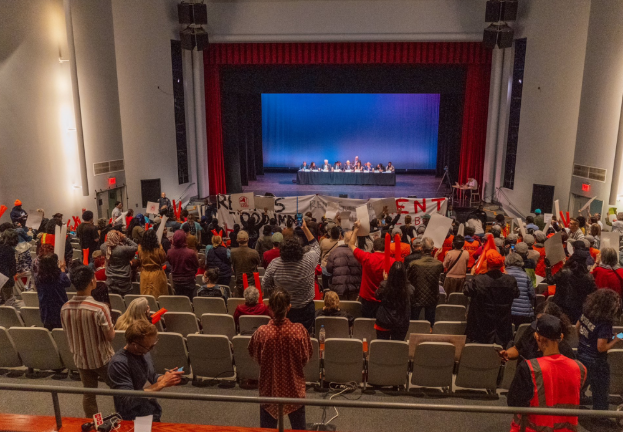Rent Guidelines Board Proposes Rent Hikes of up to 6.5 percent
The Rent Guidelines Board proposed a hike of between two and 4.5 percent for one-year rent-stabilized leases, and between four and 6.5 percent for two-year leases. The final vote is set for June 17, and would apply to leases that start after October 1. Tenant members walked out in protest before the vote.

The Rent Guidelines Board is currently considering a new range of rent hikes for NYC’s rent-stabilized units. On April 30, they proposed an increase of between two and 4.5 percent for one-year leases, and between four and 6.5 percent for two-year leases. The final vote is scheduled for June 17, with public hearings set to be held beforehand. Any hike would apply to leases that begin after October 1.
As of last June, there were over one million rent-stabilized apartments in NYC, which housed an estimated two million people.
Tenant members walked out in protest before the new round of proposed hikes were revealed, as the roar of protesting tenant advocates permeated the meeting. Landlord members unsuccessfully proposed an even higher hike: between six and eight percent for one-year leases, and between nine and 11 percent for two-year ones.
“If you ask me whether my voice as a tenant rep counts. I doubt it,” said tenant member Genesis Aquino. “If the voices of the NYC tenants matter in this process, I’d say no. I think the process is a sham.”
“I learned this year that people just show up with their mind already made up. They’re gonna vote on the same increases as last year, despite real estate getting everything they wanted in the state budget,” she added. “Any increases today will be putting the gallows on tenant’s neck. It’s time to de-commodify housing and get [rent] rollbacks, on SROs (single-room occupancy units) and apartments.”
”I wish that the board would understand the inherent imbalance of power in this process,” her fellow tenant member Adán Soltren said.
Soltren also believed that the board would approve rent hikes no matter what: “It’s truly remarkable that in the history of the RGB, no matter the data, no matter the circumstances....the result is the same. Net operating incomes down? Rent increase. Net operating income is up? Net increase. Operating costs are up? Rent increase. Operating costs are down? Rent increase.”
”Let’s be clear: your actions are contributing to more evictions, more homelessness, more gentrification, more food insecurity, and the destabilization and destruction of low-income households of color,” he concluded, shortly before heading offstage.
Landlord–or owner–members unsurprisingly offered another narrative. Christina Smyth also brought up net operating income, otherwise known by the acronym NOI, and claimed that it was currently down. “We cannot let this trend continue,” she said.
Fellow owner member Rob Ehrlich said that tenants that can’t afford rent increases should seek out financial assistance programs, specifically the SCRIE (Senior Citizen Rent Increase Exemption) and the DRIE (Disability Rent Increase Exemption).
The final preliminary measure based by a vote of 5-2, with both owners members voting no after their higher proposal failed. The tenant members that had walked out were counted as abstentions.
Mayor Eric Adams chimed in with a statement on the vote later that day, in which he somewhat precariously tried to appease both landlord and tenant advocates.
“Tenants are feeling the squeeze of a decades-long affordability crisis, which has been accelerated by restrictive zoning laws and inadequate tools that have made it harder and harder to build housing,” Adams said. “While the Board has the challenging task of striking a balance between protecting tenants from infeasible rent increases and ensuring property owners can maintain their buildings as costs continue to rise, I must be clear that a 6.5 percent increase goes far beyond what is reasonable to ask tenants to take on at this time.”
The Legal Aid Society, which includes tenant advocacy as part of its work, issued a far blunter statement of their own: “We strongly condemn the Rent Guidelines Board for their preliminary vote to increase rents for New Yorkers living in rent stabilized units. This increase will have devastating consequences for low-income tenants, many of whom are already rent burdened or severely rent burdened.” The nonprofit asked the board to consider a rent freeze instead.
Manhattanites that are seeking to comment on the proposed hikes can do so on May 23, at the Landmarks Preservation Commission Conference Room of the David N. Dinkins Municipal Building. It’s located on the 9th floor at 1 Centre Street. That meeting will be held at 9:30 a.m.